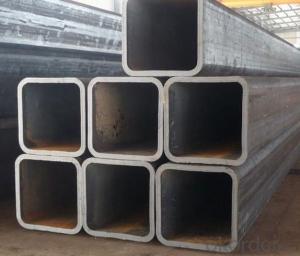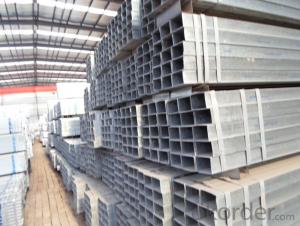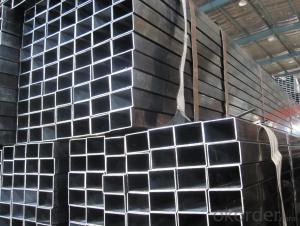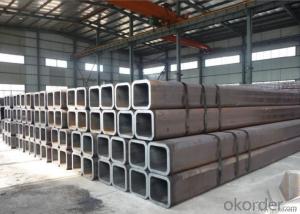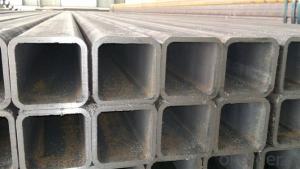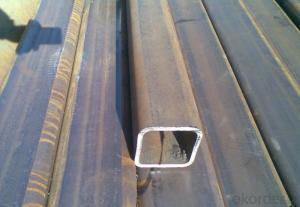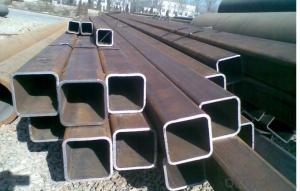Rectangular Steel Pipe Production Serious
- Loading Port:
- Tianjin
- Payment Terms:
- TT OR LC
- Min Order Qty:
- 25 m.t.
- Supply Capability:
- 7000 m.t./month
OKorder Service Pledge
OKorder Financial Service
You Might Also Like
1、Structure of Rectangular Steel Pipe Production Serious API A10653:
Rectangular Steel Pipe Production Serious is formed by drawing a solid billet over a piercing rod to create the hollow shell. As the manufacturing process does not include any welding, seamless pipes are perceived to be stronger and more reliable. Historically Rectangular Steel Pipe Production Serious was regarded as withstanding pressure better than other types, and was often more easily available than welded pipe.and we always to provide you discount, we are trying to give every customer best price and satisfy price.
2、Main Features of the Rectangular Steel Pipe Production Serious API A10653:
• High manufacturing accuracy
• High strength
• Small inertia resistance
• Strongly heat dissipation ability
• Good visual effect
3、Rectangular Steel Pipe Production Serious API A10653 Specification:
Standard | GB, DIN, ASTM ASTM A106-2006, ASTM A53-2007 |
Grade | 10#-45#, 16Mn 10#, 20#, 45#, 16Mn |
Thickness | 8 - 33 mm |
Section Shape | Round |
Outer Diameter | 133 - 219 mm |
Place of Origin | Shandong, China (Mainland) |
Secondary Or Not | Non-secondary |
Application | Hydraulic Pipe |
Technique | Cold Drawn |
Certification | API |
Surface Treatment | factory state or painted black |
Special Pipe | API Pipe |
Alloy Or Not | Non-alloy |
Length | 5-12M |
Outer Diameter | 21.3-610mm |
Grade | 20#, 45#, Q345, API J55, API K55, API L80, API N80, API P110, A53B |
Standard | ASME, ASTM |
1) Material:20#(ASTM A 106/A53 GRB.API5LGRB,GB),45#,16Mn,10#.
2) Specification range:OD:21.3-610mm,WT:6-70mm,length:6-12m or according to the requirement of clients.
3) Excutive standards:GB,ASME API5L.ASTM A 106/A53,Despite of the above standards,we can also supply seamless steel pipe with standard of DIN,JIS,and so on,and also develop new products according to the requirements of our clients!
4) Surface:black lacquered,varnish coating or galvanized.
5) Ends:Beveled or square cut,plastic capped,painted.
6) Packing:bundles wrapped with strong steel strip,seaworthy packing.
4、Packaging & Delivery
Packaging Details: | seaworthy package,bundles wrapped with strong steel strip |
Delivery Detail: | 15-30days after received 30%TT |
5、FAQ of Rectangular Steel Pipe Production Serious API A10653:
①How is the quality of your products?
Our products are manufactured strictly according to national and internaional standard, and we take a test on every pipe before delivered out. If you want see our quality certifications and all kinds of testing report, please just ask us for it.We company professional to provide these serious of pipes and what we can give you is not only in good sprice, the most important is we can provide you good quality. Guaranteed: If products’ quality don’t accord to discription as we give or the promise before you place order, we promise 100% refund.
②How about price?
Yes, we are factory and be able to give you lowest price below market one, and we have a policy that “ for saving time and absolutely honest business attitude, we quote as lowest as possible for any customer, and discount can be given according to quantity”,if you like bargain and factory price is not low enough as you think, just don’t waste your time.Please trust the quotation we would give you, it is professional one.Guaranteed: If products’ quality don’t accord to discription as we give or the promise before you place order, we promise 100% refund.
③Why should you chose us?
Chose happens because of quality, then price, We can give you both.Additionally, we can also offer professional products inquiry, products knowledge train(for agents), smooth goods delivery, exellent customer solution proposals.Our service formula: good quality+good price+good service=customer’s trust
SGS test is available, customer inspection before shipping is welcome, third party inspection is no problem.
6、Rectangular Steel Pipe Production Serious API A10653 Images:
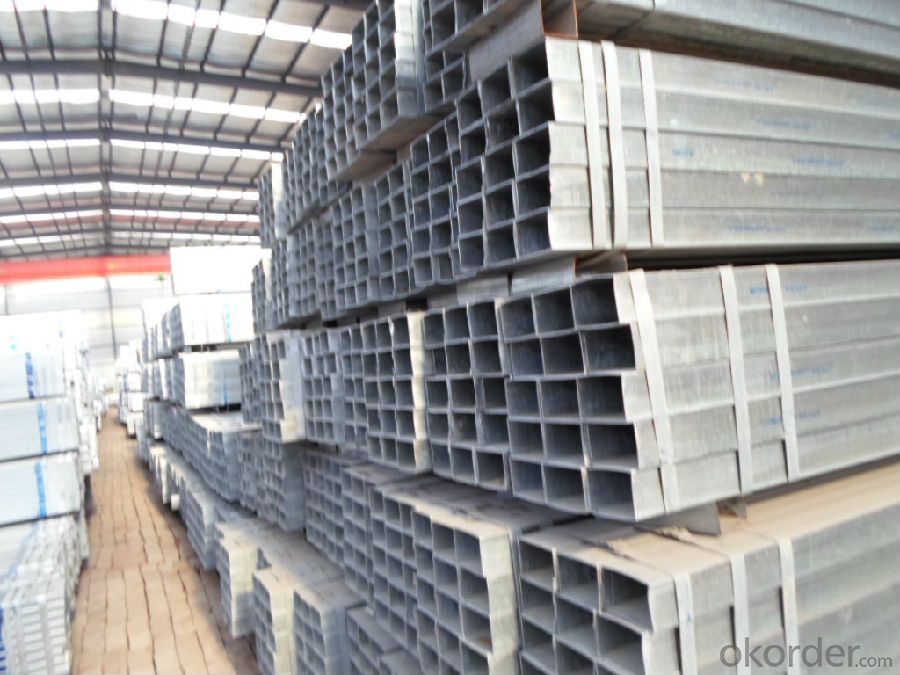
- Q: What is the difference between internal and external coating for steel pipes?
- A protective layer is applied to the inner surface of steel pipes, which is known as internal coating. The main purpose of this coating is to prevent corrosion and enhance resistance against chemicals present in the fluid being transported. Techniques like spraying, brushing, or dipping are commonly used to apply the internal coating, and it can be made of materials such as epoxy, polyurethane, or cement mortar. On the contrary, external coating involves the application of a protective layer on the outer surface of steel pipes. The main objective of this coating is to protect against environmental factors like corrosion, abrasion, and impact. External coatings are usually applied through methods like wrapping or coating with materials such as polyethylene, fusion-bonded epoxy, or asphalt enamel. To summarize, the primary difference between internal and external coating for steel pipes lies in their location and purpose. Internal coatings safeguard the inner surface from corrosion and chemical attacks, while external coatings provide protection against environmental damage on the outer surface. Both types of coatings are essential to ensure the durability and reliability of steel pipes in various applications.
- Q: How are steel pipes used in the construction of telecommunications towers?
- Steel pipes are used in the construction of telecommunications towers as they provide structural support and stability. They are used as the main framework for the tower, forming the vertical columns, horizontal bracing, and diagonal supports. These pipes are capable of withstanding heavy loads, high winds, and other environmental factors, ensuring the tower's durability and longevity. Additionally, steel pipes allow for easy installation and maintenance of antennas, cables, and other telecommunications equipment.
- Q: How do you repair damaged steel pipes?
- To repair damaged steel pipes, the first step is to assess the extent of the damage. If it's a small crack or hole, it can be fixed using a steel-filled epoxy or a pipe repair clamp. However, for more significant damage, such as extensive corrosion or a large rupture, cutting out the damaged section and replacing it with a new pipe is usually necessary. In some cases, professional welding or soldering may be required to ensure a secure and leak-proof repair.
- Q: Can steel pipes be used for structural applications?
- Indeed, structural applications can make use of steel pipes. With their high strength, durability, and ability to withstand various environmental conditions, steel pipes prove to be suitable for such purposes. The construction industry often relies on them to fabricate buildings, bridges, and other structures. Notably, steel pipes possess exceptional load-bearing capacity and can endure heavy loads, making them perfect for supporting structures and transferring loads. Moreover, the ease with which steel pipes can be fabricated, welded, and connected facilitates efficient construction. As a result, steel pipes emerge as a dependable and cost-effective choice for structural applications.
- Q: What are the standard specifications for steel pipes?
- The standard specifications for steel pipes vary depending on the specific application and industry requirements. However, some common standard specifications for steel pipes include dimensions, material composition, strength, and testing procedures. These standards are set by organizations such as the American Society for Testing and Materials (ASTM), the International Organization for Standardization (ISO), and other national or international bodies. It is important to consult the appropriate standard specifications for specific project needs.
- Q: How are steel pipes protected against external damage?
- Steel pipes are protected against external damage through various methods such as anti-corrosion coatings, insulation materials, and cathodic protection systems. These measures help prevent corrosion, impact, and abrasion, ensuring the durability and longevity of the pipes.
- Q: Can steel pipes be used for transporting gases and liquids?
- Yes, steel pipes can be used for transporting gases and liquids. Steel pipes are commonly used for this purpose due to their durability, strength, corrosion resistance, and ability to withstand high pressures. Additionally, steel pipes are versatile and can be customized to meet specific requirements for different types of gases and liquids.
- Q: What is the difference between steel pipes and concrete-lined pipes?
- Steel pipes are made entirely of steel and are known for their strength and durability. They are commonly used in various applications, including transporting liquids and gases, as well as structural support. On the other hand, concrete-lined pipes are made of steel with a layer of concrete applied to the inner surface. This concrete lining provides additional protection against corrosion and abrasion, making them suitable for transporting corrosive materials or in aggressive environments. The concrete lining also helps in reducing friction within the pipe, resulting in improved flow efficiency.
- Q: Is there any difference between HFW steel pipe and ERW steel pipe?
- ERW steel is high frequency ERW pipe, English Electric Resistance Welding, referred to as the abbreviation of machined steel in diameter and wall thickness of the pipe size range, with greater flexibility, especially in production
- Q: How are steel pipes used in the petrochemical industry?
- Steel pipes are extensively used in the petrochemical industry for various applications such as transporting oil, gas, and other fluids. These pipes are highly durable and can withstand high pressure and extreme temperatures, making them ideal for the harsh conditions in petrochemical plants. Additionally, steel pipes are resistant to corrosion, ensuring the safe and efficient transportation of chemicals. They are also used for structural support and as conduits for electrical wiring in petrochemical facilities. Overall, steel pipes play a crucial role in the petrochemical industry by enabling the safe and reliable transportation of fluids and providing structural integrity.
Send your message to us
Rectangular Steel Pipe Production Serious
- Loading Port:
- Tianjin
- Payment Terms:
- TT OR LC
- Min Order Qty:
- 25 m.t.
- Supply Capability:
- 7000 m.t./month
OKorder Service Pledge
OKorder Financial Service
Similar products
Hot products
Hot Searches
Related keywords
